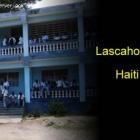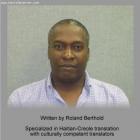ADVERTISEMENT
Education
The education system in Haiti faces shortages in educational supplies and qualified teachers, and the rural population remains underrepresented in the country%u2019s classrooms.There are many challenges. Currently, most Haitian schools are private rather than state-funded
Embezzlement of PSUGO funds, Haiti Education
ULCC Cracks Embezzlement Ring at PSUGO Schools. The Ministry of Education sent fraud protection group, Unity of Fight against Corruption (ULCC), to do an investigation on schools receiving money from the Universal Program Free and Compulsory (PSUGO), funded by the U.S.
They found embezzlement schemes at 100 schools, whose administrators were amassing large sums of money by inflating the number of students registered for school.
PSUGO subsidizes each registered student for $90 USD. State officials were also in on the scheme.
Haitian Caribbean Book Fair by Sosyete Koukouy of Miami
The joy of reading books can't be described in words. It's something that you understand only by real experience. Most readers report a better understanding of other people's feeling. They have a greater capacity for empathy and it is easier to make decisions, and prioritizing plans. Book fairs play a greater role in encouraging the reading habit among people of all age groups.
During the last week of May on 23 & 24, the Haitian authors will celebrate the third annual Haitian Caribbean Book Fair in Little Haiti under sponsorship of Sosyete Koukouy of Miami, with support from and the John S. and James L. Knight Foundation, as part of its Knights Arts Challenge, and Miami-Dade Cultural Affairs, Miami-Dade Board of County Commissioners, City of Miami and Commissioner Keon Hardemon. Sosyete Koukouy, Inc is a cultural and artistic organization founded in 1985, dedicated to the advancement of Haitian culture in the United States through education, arts, and cultural presentations for Haitians in South Florida and beyond. The organization is celebrating its own 30th anniversary this year.
Third Annual Haitian Caribbean Book Fair in Little Haiti
During the last week of May on 23 & 24, Haitian families turned out for the third annual Haitian Caribbean Book Fair in the Little Haiti neighborhood of Miami under sponsorship of Sosyete Koukouy. Sosyete Koukouy of Miami is a group dedicated to preserving the Haitian culture in the United States. The fair will exhibit over 7,000 books written in French, Creole, English, and Spanish. The day-long festival includes workshops, Caribbean food and puppet shows. The main motto of the fair is to promote and develop book reading habits, especially among the young people and hold on to own culture as the neighborhood becomes gentrified. The readers will have the opportunity to interact with their favorite authors and the authors will have direct feedbacks from their readers. Admission is free.
Three Out Of Ten Haitians Are Still Illiterate In Haiti
Illiteracy is the basic and the worst problem that we are facing today in this modern world. An illiterate person is like a handicapped person who is unfamiliar with the happenings in his surroundings, cannot even competently do own basic day to day activities; remain unaware of their rights and duties towards the society. Higher illiteracy in a country means less human capital or less knowledgeable and skilled people in the country. Haiti's illiteracy rate is the highest in the Western Hemisphere. As per UNICEF report (2008- 2012), only 48.7% of the Haitian adult population can read and write adequately. As per Gustavo Gallon's report (a U.N. independent expert) presented to the Geneva-based U.N. Human Rights Council on March 2015, roughly half of Haiti's 10 million people are unable to read or write and many can't avail their basic rights.
Political Exiles Danielle Legros Georges, Boston's New Poet
Poetry is the evidence of life in most distilled and most powerful language. Poetry is not only about the dreams and visions; it is the skeleton architecture of our lives, and it is the universal language which the heart holds with nature and itself. According to Danielle Legros Georges, some people love poetry and use poetry and are comfortable with poetry. But there are those for whom poetry may be a giant living in the hills. She wants people to recognize that poetry isn't frightening. Danielle Legros Georges is a poet who was born in Haiti and grew up in Boston's Haitian community in Mattapan. When she was a baby, her family moved to Zaire on a political exile. Later, they moved to Boston when she was 6 years old. She was born in a well cultured family. Her all three brothers are in creative fields: one is a clothing designer for extreme sports, one is an architect and photographer and one is a musician. Her father was an architect and engineer and mother was an employee of the Federal Reserve Bank and an exceptionally good cook. Danielle has been teaching in Lesley University's Creative Arts in Learning Division since 2001. During the Christmas of 2014, Mayor of Boston Martin J. Walsh has named her as the Boston's new poet laureate, the second poet laureate, following Sam Cornish, who won the position in 2008.
Haiti teacher Guy Etienne among 10 finalists for $1 million prize
An innovative idea to get a broken traffic light to work again at the corner of John Brown and Martin Luther in Port-au-Prince by the privately run College Catts Pressoir contributed to place their teacher in international stage.
The school chemistry teacher Guy Etienne teaches student leadership and problem solving skills
Guy Etienne of Haiti is competing for a $1 million award as the World's Most Exceptional Teacher, given by the Varkey Foundation. Etienne has made it to the final 10 and will travel to Dubai where the winner will be announced at the Varkey Foundation's Global Education and Skills Forum.
No more Money for Proctoring and Correcting State Exams
Minister of Education, Nesmy Manigat, following a consulting session with the Trade Union and Employers' Sector, has decided proctoring and correcting of official examinations by private or public school teachers will no longer be compensated. Savings derived from this budget cut will permit inclusion of extra teachers into the education system.
A Circular was issued explaining how the decision to forgo compensation for proctoring and correcting examinations was made, and the formation of a corrective body, whose responsibility it is to ensure the integrity of the official examination process.
The Ministry of Education has been receiving complaints from the education community as well as parents, challenging the probity of the proctoring and correction process. In addition, the Commission for the Observation of the Conduct of State Examinations (CODEXE) recommended the Ministry of Education (MOE) needed to manage its resources more effectively. Together with the Ministry of Education and Vocational Training (MENFP), CODEXE notified education leaders a decision had been made to form ". . . an official corrective body responsible for assessing student copies on . . . state exams."
No more Money for Proctoring and Correcting State Exams
Minister of Education, Nesmy Manigat, following a consulting session with the Trade Union and Employers' Sector, has decided proctoring and correcting of official examinations by private or public school teachers will no longer be compensated. Savings derived from this budget cut will permit inclusion of extra teachers into the education system.
A Circular was issued explaining how the decision to forgo compensation for proctoring and correcting examinations was made, and the formation of a corrective body, whose responsibility it is to ensure the integrity of the official examination process.
The Ministry of Education has been receiving complaints from the education community as well as parents, challenging the probity of the proctoring and correction process. In addition, the Commission for the Observation of the Conduct of State Examinations (CODEXE) recommended the Ministry of Education (MOE) needed to manage its resources more effectively. Together with the Ministry of Education and Vocational Training (MENFP), CODEXE notified education leaders a decision had been made to form ". . . an official corrective body responsible for assessing student copies on . . . state exams."
Hopkins School of Nursing brings Hope and Healing to Haiti
RN Beth Sloand of Hopkins School of Nursing (HSN) has been coming to Haiti since 2000. She spearheads a program 75 students and 40 faculty members participate in. They land in Haiti three times each year to treat and educate local communities on clean water and sanitation practices. Because the school has gotten to know the communities over a long period of time, and built trusting relationships, change has been able to take hold, making small improvements possible.
HSN's mission is to offer hope and sustainable resources to residents. According to Sloand, oftentimes students "develop a heart for Haiti", making their work ". . . heartbreaking and hard to swallow." She adds in 2010 the situation after the earthquake was dire: infrastructure was reduced to rubble in communities and peoples' health was endangered by homelessness and the cholera epidemic. She remembers her team treated hundreds of survivors, ". . . but there would still be children crying for shelter or medical care . . ." Despite the pain, it motivated everyone to persevere.
Yanick Lahens from Haiti wins France's Femina literary prize
Acclaimed novelist Yanick Lahens was honored recently with a very prestigious award. The prize was for her work on the much-loved "Bain de lune", and the award itself was for the Femina Prize. The honor holds special weight seeing as the recipient is a Haitian born writer, and her taking home the award given by a jury made up entirely of female judges is a huge feat.
Her novel, "Bain de lune", is a stirring epic novel that focuses on a Haitian family and the challenges they face. The Femina jury made a statement through their spokeswoman, Christine Jordis, saying that Lahens had a big capacity for storytelling. Jordis described how the author wrote on her long-dead ancestors and their influence on those now living. As such, according to Jordis, Lahens was able to bring people out of their present-day lives and transplant them in the lush world created by her imagination.
Our objective is to share with you news and information about Haiti and the people of Haiti. Traditions, habits and the way we were or grew are alive in this site. We highly recommend that you Subscribe to our Newsletter and also share with us some of the things that are memorable and made us unique people.

 Life After Death
Life After Death  Something to think about
Something to think about  Lascahobas, Haiti
Lascahobas, Haiti  Haitian Creole Translation
Haitian Creole Translation  Haitians are a Proud People
Haitians are a Proud People